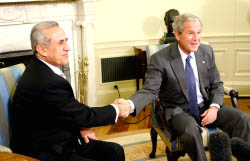 WASHINGTON: Lebanese President Michel Sleiman emphasized on Thursday the need to liberate Lebanese territories occupied by Israel and told US President George W. Bush that the future of Palestinian refugees was in their homeland, not in Lebanon. Bush welcomed Sleiman for talks Thursday to underline US support for democratic rule in Beirut free from any undue foreign influence. Lebanese-Americans "want Lebanon to be free and sovereign and independent, and so do I, and so do you," Bush told his guest during a brief joint public appearance as they met in the Oval Office for the first time. "We are here, also, to reaffirm our right to have a prosperous, Lebanon, a democratic Lebanon, a country that is diverse in its nature and through its people," Sleiman said. Bush praised Lebanon’s ongoing national reconciliation talks, which bring together rival political leaders in a national dialogue that will set the tone for parliamentary elections due next year. "We’re most impressed by the national dialogue that you’re holding in an attempt to seek reconciliation. The US is proud to stand by your side. Our mission is your mission: a country that is strong, and capable, and a country where people can live in peace," said Bush. "It’s been a long time since the president of Lebanon has been in the Oval Office. And it is my honor to host you for this occasion," said Bush. "I am delighted to be here," said Sleiman. "I am here to thank you for all the efforts you have undertaken to support Lebanon, particularly the Lebanese military institutions."
WASHINGTON: Lebanese President Michel Sleiman emphasized on Thursday the need to liberate Lebanese territories occupied by Israel and told US President George W. Bush that the future of Palestinian refugees was in their homeland, not in Lebanon. Bush welcomed Sleiman for talks Thursday to underline US support for democratic rule in Beirut free from any undue foreign influence. Lebanese-Americans "want Lebanon to be free and sovereign and independent, and so do I, and so do you," Bush told his guest during a brief joint public appearance as they met in the Oval Office for the first time. "We are here, also, to reaffirm our right to have a prosperous, Lebanon, a democratic Lebanon, a country that is diverse in its nature and through its people," Sleiman said. Bush praised Lebanon’s ongoing national reconciliation talks, which bring together rival political leaders in a national dialogue that will set the tone for parliamentary elections due next year. "We’re most impressed by the national dialogue that you’re holding in an attempt to seek reconciliation. The US is proud to stand by your side. Our mission is your mission: a country that is strong, and capable, and a country where people can live in peace," said Bush. "It’s been a long time since the president of Lebanon has been in the Oval Office. And it is my honor to host you for this occasion," said Bush. "I am delighted to be here," said Sleiman. "I am here to thank you for all the efforts you have undertaken to support Lebanon, particularly the Lebanese military institutions."
"We are also here to reaffirm the need to liberate all Lebanese territories, and also to make it very clear that the future of Palestinian refugees is in their homeland – not in Lebanon," the Lebanese leader said. "We believe that this is in the interest of Lebanon as well as it’s in the interest of the Palestinian people themselves," the Lebanese president told Bush through a translator. An estimated 400,000 Palestinian refugees live in 12 camps in Lebanon. According to the United Nations agency responsible for Palestinian refugees, there are around 4.6 million Palestinian refugees worldwide. Most of the Palestinian refugees came to Lebanon when the state of Israel was created in 1948. Others fled to the country during the 1967 war. There are fears among the Lebanese that their settlement will be permanent, shifting the country’s delicate sectarian balance. Neither leader specifically mentioned Syria, which withdrew its forces from its smaller neighbor after the assassination of former Premier Rafik Hariri in 2005, a killing that was widely blamed on Damascus. Syria denies involvement. Deep-seated divisions over Hizbullah’s arsenal fuel widespread skepticism that the national dialogue will yield a defense strategy for Lebanon. A first session was held on September 16 and another has been set for November 5. – AFP, with The Daily Star



